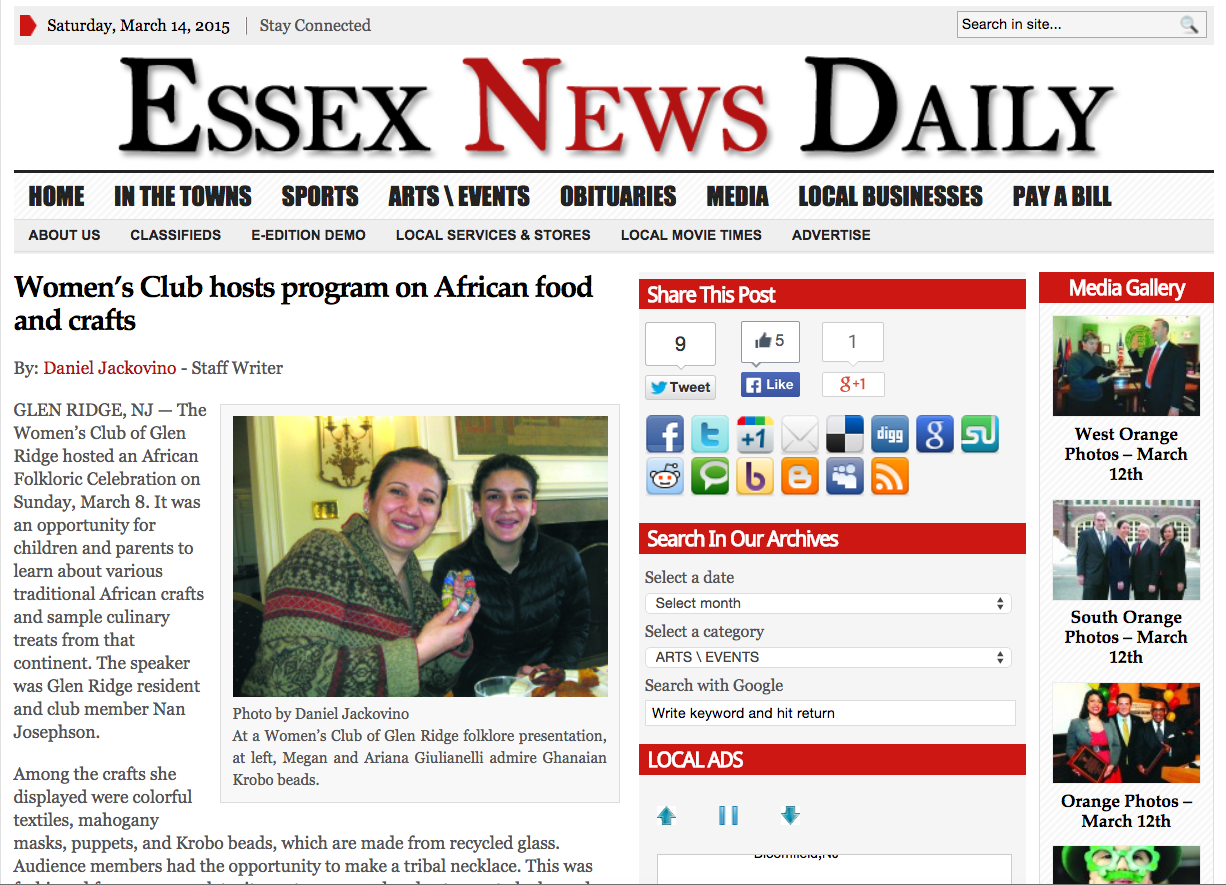|
In the News
Women’s Club Hosts Program
On African Food & Crafts
Read the original article on Essex News Daily
By: Daniel Jackovino - Staff Writer

GLEN RIDGE, NJ — The Women’s Club of Glen Ridge hosted an African Folkloric Celebration on Sunday, March 8. It was an opportunity for children and parents to learn about various traditional African crafts and sample culinary treats from that continent. The speaker was Glen Ridge resident and club member Nan Josephson.
Among the crafts she displayed were colorful textiles, mahogany masks, puppets, and Krobo beads, which are made from recycled glass. Audience members had the opportunity to make a tribal necklace. This was fashioned from a paper plate, its center removed and cut open to be looped about the neck. Decorated with costume jewelry and feathers, some results were impressive.
There was also a textile on display called adinkra cloth. This was a narrow, flowing panel of lightweight fabric. Decorative patterns were repetitively stamped on the panels which would be sewn together. The stamp was made from the shell of a calabash gourd and called, appropriately enough, a calabash stamp. Josephson said the adinkra cloth displayed was actually made in China. This drew a murmur of laughter from a small but attentive audience. But the patterns decorating them were Ghanaian patterns, she said reassuringly.
Josephson was the speaker, she explained during a break in her presentation, because she was the chairperson of the international committee at the club, and because talking about Africa came easy to her. She travels to Africa twice a year in an attempt to improve the lives of African children and women, she said. She does this through the African Teach Foundation, which she founded in 2001. This is a small non-profit organization with Josephson as the CEO. It has four board of directors and seven regular members. The foundation operates out of Josephson’s home. It provided a booklet for the event that gave craft instructions and recipes.
The foundation has a number of programs to benefit four scattered villages in Ghana, Josephson said. She hopes to eventually find the resources to offer similar programs in Kenya.
In Ghana, the villages are Teshie/Nungua, Nswam, the Volta Region and Osiem. One of the members of the foundation is Frank Otchere, the king of Osiem.
He lives and works in New Jersey, according to the foundation website. One program, Josephson said, provides modest scholarships and text books to young women in these four villages for public schooling.
"It’s not like here," Josephson said of the schools. "They have dirt floors and if there is a roof, it leaks." And the teacher is generally a high school graduate.
"They’re expected to teach what they remember," she said. "It’s rare that there is a text book."
Another foundation program is to provide education to women about domestic violence, sexual assault and child abuse. The foundation also provides the village schools with information about HIV. Josephson said this is mandatory in Africa for two reasons. One is that the disease is widespread. The second is that African governments would not allow foundations to operate in their villages unless HIV education is provided.
Domestic-violence training is provided to the police and public officials by the foundation.
"How to recognize it and to understand it’s about power and control," she said about domestic violence.
Josephson, who has her doctorate in education, also provides domestic-violence training to students at Jasikan Teachers College, which is part of the University of Ghana.
There is also an effort by the foundation to provide these Ghanaian villages with libraries.
"I’m talking humble libraries," she said. “One room and how to use it. In our country, we have a respect for libraries. In Africa, they don’t, in the villages, understand the importance of books and lifelong learning."
There will also be a visiting artists program in March 2016, according to Josephson, when five artists will travel with her to Africa. She said the artists are Fiona Richards, from the United Kingdom, Canadian Ellen Jewett, and Americans Lisa Pavelka, Christi Freisen and Angelo Ciotti.
"Angelo is a reclamante artist," she said. "He will provide a playground and teach environmental ecology."
Josephson said environmental ecology is virtually unheard of in Africa except for possibly in Egypt, Morocco and South Africa.
"I go to the poor countries," she said. "And we’re doing a feasibility study outside of Nswam. We’re going to see if we can build a modest school — two rooms and a bathroom. We’re trying to raise about $30,000 to build that school. Angelo would help build it with the village. Our dream is to do this in the summer of 2016."
Among the culinary offerings at the celebration at the Women’s Club on Sunday were Egyptian roasted garbanzo beans, Ghanaian sweet potato fries, Mbatata sweet potato cookies, Sudanese savory pita chips, peanut butter candy, and South African picnic bread. Most of the food was spicy. The picnic bread tasted American. Its ingredients included cheddar cheese, bacon, butter, eggs, chili sauce and flour.
And there was also another similarity shared by America and Africa and that was in education. According to Josephson, arts were often eliminated from a public school education. This was because the government was stressing reading, writing and arithmetic as the path to success. Josephson said in the villages she endeavors to help, the parents are concerned that school curriculums are not providing instruction in traditional African crafts.
"They feel their children are losing that connection with their heritage," she said. "If we build our little school, art will be a part of it."
Read the original article on Essex News Daily
By: Daniel Jackovino - Staff Writer
|